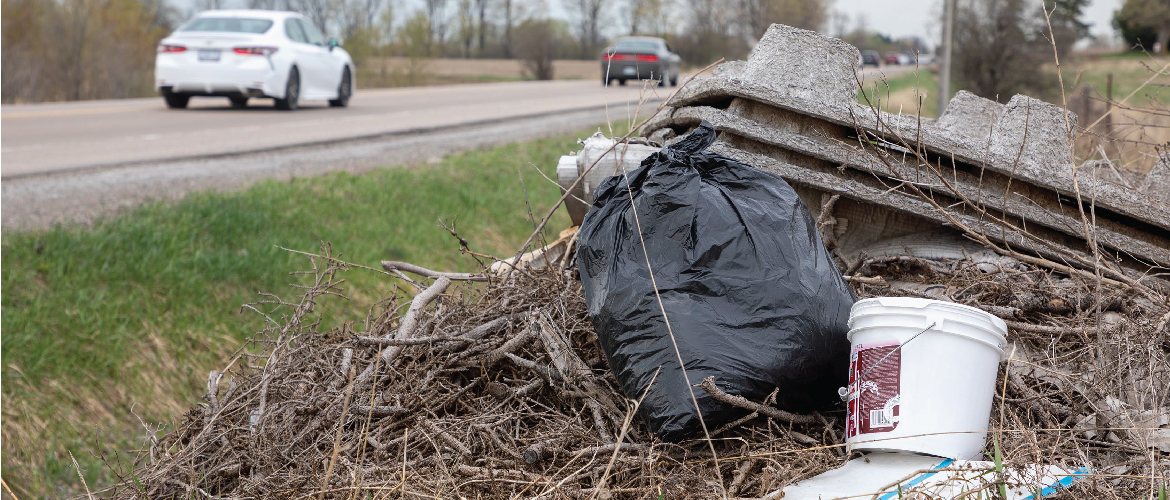Litter
Litter is a Problem in York Region

Illegal dumping of construction materials and household waste can be seen along roadsides and in some cases even blocking traffic.
Garbage is also being dumped at York Region Transit stops including household waste and large items such as mattresses.
To protect our environment for future generations, it’s important for everyone to do their part to keep their community, streets, parks and waterways clean and litter-free.
If you see Illegal Dumping, Report it
It is a reportable offence and can have significant penalties.
To report illegal dumping on Regional roads (main roadways that connect our nine local cities and towns):
- Report the illegal dumping by completing an online form
- Email @email
- Call 1-877-464-9675
To report illegal dumping on a city or town street (neighbourhood roads), please contact the city or town you are in.
Why Litter is an Issue
- Plastic litter does not break down and can last hundreds of years in our environment
- Litter can blow into storm drains, creeks, streams, rivers and lakes and contaminate the water and harm aquatic animals
- Litter can be ingested or cause physical harm to pets and local wildlife
- Some litter such as needles and broken bottles can injure people
- Litter is unsightly
What you can do
- Always dispose of your waste responsibly
- Keep your waste until you find the right bin or dispose of it at home
- Say no to single-use, disposable items and packaging whenever possible
- Switch to reusable alternatives (e.g., reusable containers, mugs, bottles, bags, cutlery, straws)
- Bring waste items that can’t be picked up by your waste collector to one of York Region's waste depots
- Pick up litter during your regular walks or hikes
- Organize or join local cleanup events
- Support a Circular Economy by donating items that you no longer want instead of throwing them away
Organizing Local Cleanup Events
- Contact your local city or town in advance to determine how to manage the litter you collect
- Promote your cleanup through social media and use #ActONLitter
- Target trails, parks, play areas, vacant lots, parking lots or neighbourhood sidewalks
- Consider using smaller bags for your cleanup and disposing of in your own personal garbage
- Use separate bags for recyclables and litter
- Not sure where it goes? Check our search tool at york.ca/bindicator
- For helpful tips and checklists refer to Ontario's Public Litter Cleanup Guide
General Safety Tips
- Do cleanups during daylight when visibility is better
- Wear a safety vest if near roadsides or high-traffic areas
- Wear gloves or use a litter grabber or tongs when picking up litter
- Be cautious of rough, slippery terrain near ravines, riverbanks or stormwater management ponds
- Be aware of wild animals, insects, hives and nests or harmful weeds such as giant hogweed and poison ivy
- Contact your local city or town if you encounter dangerous materials; do not pick up:
- Broken bottles and glass
- Barbed wire
- Needles, syringes or sharps
- Medical waste
- Pipes
- Chemicals
- Debris with sharp or rusted edges
- Keep hazardous waste separate from garbage and recycling and contact your local city or town for proper disposal. Hazardous waste includes:
- Batteries
- Aerosol containers
- Fluorescent bulbs and tubes
- Helium or propane tanks/cylinders
- Report any suspicious items to York Regional Police at 1-866-876-5423
Adopt-a-Road
Your help is needed to keep York Region clean. We have a litter problem, and we are looking for volunteers to pitch in.
Are you an environmentally conscious citizen, a member of a community group or a business that is interested in contributing to a cleaner and more beautiful York Region?
We're looking for volunteers to help with litter collection along the boulevards of York Region roads.
Some of the program requirements include:
- A group must commit to picking up litter once a year over a two-year period
- Individuals under the age of 12 may only participate with adult supervision
- A volunteer group supervisor must be chosen
- Volunteers can only pick up litter during daylight hours (between one hour after sunrise and one hour before sunset)
For more information and to find out how you can volunteer visit york.ca/AdoptARoad


